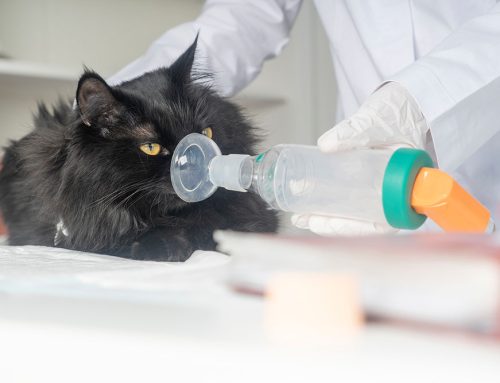Pets often experience allergic reactions, and these responses can range from mild and uncomfortable to severe and life-threatening. If your pet is affected by allergies, they should have a veterinary examination. However, a pet who is experiencing a severe allergic reaction requires emergency veterinary attention. Read our West Vets Emergency Veterinary Clinic team’s guide to learn all you need to know about pets’ allergic reactions.
What is an allergic reaction in pets?
A complex interplay among several inflammatory cells, including mast cells, basophils, lymphocytes, dendritic cells, eosinophils, and potentially neutrophils, cause an allergic reaction. These cells produce multiple inflammatory mediators that target particular body cells such as epithelial cells, fibroblasts, vascular cells, and airway smooth muscle cells. An allergic reaction occurs because the immune system reacts inappropriately to a substance it wrongly perceives as a threat. Typically, the initial exposure causes sensitization to the allergen, and later re-exposure results in an immunologic overreaction. Scientists don’t completely understand why some pets develop allergies and others don’t.
Anaphylaxis is a severe immunologic overreaction that most commonly affects a pet’s cutaneous, respiratory, cardiovascular, and gastrointestinal (GI) systems. These multiorgan system reactions are acute and potentially fatal.
What causes an allergic reaction in pets?
Your pet can develop an allergy to almost anything in their environment. Common allergens include:
- Fleas — Many pets are allergic to a flea’s saliva, and one flea bite can cause significant itchiness and skin lesions, most commonly on a pet’s lower back, inner thighs, and abdomen.
- Environmental allergens — Environmental allergens, such as pollens, grasses, molds, and dust mites, can often trigger a pet’s allergy (i.e., atopy). An affected pet may also experience issues such as chronic skin and ear infections and anal gland complications.
- Food — A pet can develop an allergy to their food, most commonly proteins such as chicken, beef, dairy, and eggs. Food allergies typically manifest as skin itchiness and lesions, and hair loss, but GI signs, including vomiting and diarrhea, may also be present.
- Chemicals — Household cleaners and air fresheners can trigger a pet’s allergic reaction.
- Insects — Insect bites and stings can cause a pet to have a severe allergic reaction.
- Medication — Any medication can trigger a pet’s allergic reaction.
- Vaccines — In rare instances, vaccines can cause a pet’s allergic reaction.
What are allergic reaction signs in pets?
Some pets’ allergic reactions are mild but others’ reactions may lead to chronic issues or life-threatening signs. Pets’ common allergic reaction signs include:
- Itchiness — The most common allergies in pets are flea allergy dermatitis (FAD), atopy, and food allergies. These conditions typically present as itchy skin. Skin lesions and hair loss also commonly occur.
- Feet chewing — Many pets affected by atopy and food allergies commonly lick or chew their feet excessively.
- Hives — Pets affected by an allergy may exhibit red, swollen, itchy welts or bumps.
- GI signs — Food allergies can cause intermittent vomiting and diarrhea. In addition, anaphylaxis affects a dog’s liver, and GI signs, such as vomiting, diarrhea, and excessive drooling, are commonly exhibited.
- Ear infections — Chronic or recurrent ear infections may indicate an allergy. Common signs include head shaking or tilting, and ear scratching or pawing, discharge, and odor.
- Facial swelling — Facial swelling typically indicates an acute allergic reaction that could lead to anaphylaxis.
- Difficulty breathing — Anaphylaxis in cats most commonly impacts the lungs, resulting in breathing abnormalities such as increased respiration rate and effort, increased abdominal movement associated with breathing, wheezing, open-mouthed breathing, and pale or blue mucous membranes. In addition, swelling around the airways can lead to breathing difficulties in pets experiencing an allergic reaction.
- Seizure — Pets affected by anaphylaxis may experience seizures.
How are allergic reactions in pets treated?
A pet’s allergic reaction treatment depends on the triggering allergen and reaction severity. Any pet who experiences an allergic reaction should receive veterinary care. If your pet experiences an allergic reaction, their treatment may include:
- Flea eradication — FAD is the most common pet allergy and the condition also commonly exacerbates other allergies, so flea control is critical to addressing pets’ allergies.
- Steroids — Veterinarians often use steroids as a first line of defense to get extreme skin itchiness and irritation under control.
- Bathing — Bathing can help remove allergens from your pet’s skin.
- Anti-itch medications — Several anti-itch medications are available to help alleviate your pet’s discomfort.
- Prescription hypoallergenic diet — If a food allergy is suspected, your primary care veterinarian will put your pet on a food elimination trial to determine what ingredient is triggering their reaction. Once the problematic ingredient is identified, your veterinarian may recommend a prescription hypoallergenic diet.
- Immunotherapy — If your pet has atopy, your veterinarian may recommend allergy testing so allergy shots can be produced to hyposensitize your furry pal to the problematic allergens.
When is an allergic reaction in pets an emergency?

Although most pets’ allergic reaction signs are not severe, some can be life-threatening. Signs that indicate your pet needs emergency veterinary care include:
- Breathing difficulties
- Collapse or unconsciousness
- Facial swelling
- Acute or severe vomiting or diarrhea
Pets experiencing anaphylaxis need veterinary care as soon as possible. If your pet is stung by an insect, use a credit card to remove the stinger to prevent further envenomation. Don’t use tweezers because this can express more venom into the wound. If your pet is experiencing anaphylaxis, our West Vets Emergency Veterinary Clinic team may provide your furry pal with epinephrine, steroids, oxygen therapy, and intravenous (IV) fluid therapy.
If your pet experiences an allergic reaction that requires emergency veterinary care, contact our West Vets Emergency Veterinary Clinic team, so we can act quickly to provide the life-saving treatment your furry pal needs.







Leave A Comment